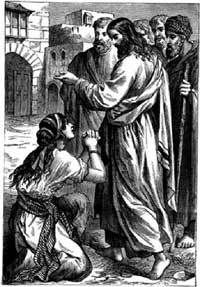
Last night, as I was doing my regular devotional Scripture reading, I read the story in Mark 7:24-30 where Jesus meets the Syrophoenician woman. I know when I first read this story it troubled me a bit, Jesus calling the woman a dog and refusing at first to heal her daughter. In the Gospel of Matthew, we get some additional information including Jesus' disciples asking him to send her away, saying that she was "crying out after them." Like many passages of Scripture, this passage has troubled my sensibilities in the past. We don't usually imagine Jesus calling a woman a "dog" and refusing to cast the demon out of a child. To get the full meaning of the word "dog" that Jesus used, I should probably add a fact from my trusty ESV Study Bible text note, that Jesus uses the word "little-dog" here which may suggest a more affectionate term. It also suggests that Jesus is not insulting the woman but testing her faith.
But I was more troubled a little over a year ago when I heard an interpretation of this passage which I think did some serious violence to the text. The person who was leading a Bible study interpreted the passage to be a lesson for the disciples, where Jesus was teaching against racism. I don't deny that there is a lesson for us in everything that Jesus said and did but I don't think the lesson in this passage is about racism. The interpreter who made this claim in leading the Bible study imagined that perhaps the disciples were begging Jesus to send her away because she was a Gentile and were perhaps also using racial epithets, like "dog," to describe her. This interpreter then speculated that Jesus called the woman "dog" in a sarcastic tone of voice to make fun of the disciple's use of the term.
I think the need for such an outlandish interpretation comes from our very American way of elevating individual "rights" above almost any other directive in determining what is right action. And we can't imagine Jesus going against this idea of individual rights which has become so sacred to us. After all, didn't the Syrophoenician woman have the same "right" to have her daughter healed as would a Jewish person?
To this question I have to answer with a strong "no." This woman had no right to have anything done for her by God. I have no right to gain any good thing from God and neither does anyone else for that matter. Jesus was the only one who had any "right" to any good thing and he suffered death on a cross. In fact if we have any "right" to anything at all, it is a "right" to hell which is what we earn by our sins.
I believe that this passage has nothing to do with "rights" and everything to do with "grace" which is undeserved. This woman and her daughter deserved nothing from Jesus and yet they received healing and grace because of the woman's faith and because of our Savior's great love. This encounter between Jesus and this woman also foreshadows the grace which would be made available to all Gentiles as the Gospel spread after Pentecost. Another thing I believe is that the moment "rights" come in when dealing with God, grace is negated. If we have any right to a good thing from God then God is simply holding up his end of the bargain and would be wrong not to do so. But that is not the picture we get from Scripture. When it comes to our "rights" before God, we are like the tax-collector in Luke 18:9-14 who, "standing far off, would not even lift up his eyes to heaven, but beat his breast, saying, 'God, be merciful to me, a sinner!'" And Christ says that this tax-collector who knew he had no "rights" was the one who went away justified as opposed to the pharisee who thanked God that he was, "not like other men." And the amazing thing is that when God justifies us, through the death and resurrection of our Lord Jesus Christ, we are told that He does confer a "right" upon us. John, in his Gospel, says, "But to all who did receive him, who believed in his name, he gave the right to become children of God, who were born, not of blood nor of the will of the flesh nor of the will of man, but of God (John 1:12-13)."




